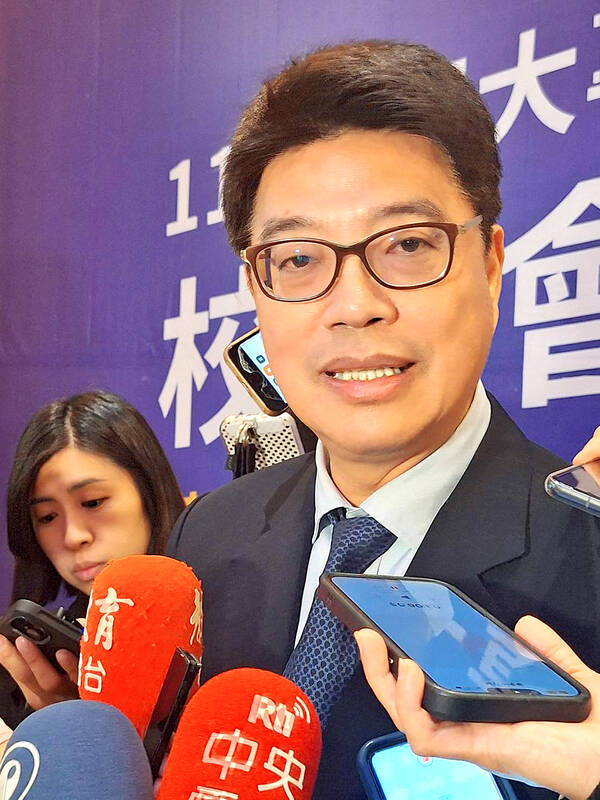Taiwan urges Beijing not to use academic exchanges as “united front” tactics against Taiwan, Mainland Affairs Council (MAC) Minister Chiu Chui-cheng (邱垂正) said yesterday.
Taiwan welcomes Chinese students and included them in the National Health Insurance (NHI) system last year, he said.
Chiu made the remarks after the Ministry of Education on Thursday banned Chinese colleges and universities affiliated with Beijing’s United Front Work Department from conducting academic exchange programs with Taiwanese schools.

Photo: CNA
The blacklist includes Jinan University, Huaqiao University and Beijing Chinese Language and Culture College. The former’s diplomas would no longer be recognized by the ministry, while the latter two never obtained recognition.
Chiu yesterday said that the ministry has given sufficient reasons for the new policy, which the MAC would respect and support.
Taiwanese students could still choose from the remaining 154 Chinese universities to gain a degree recognized in Taiwan, even though Jinan University is disqualified, he said.
Many parents of Chinese students have made telephone calls to the ministry or the MAC asking whether their children could study in Taiwan, Chiu said.
Noting that prior approval from the Chinese government is required, he said that Beijing’s stringent regulation on outbound travel is the main reason that cross-strait academic exchanges are limited, and he called for prompt communications between admission authorities on both sides to improve the situation.
The government embraces Chinese students and has prepared for them by launching more than 10 preferential schemes to aid their academic pursuit in Taiwan, including offering the NHI system, simplifying procedures for Chinese students at customs and expanding recognition of educational credentials to 346 Chinese universities, Chiu said.
Discussion is ongoing about how to provide similar academic exchange programs for Chinese students with permanent residence or dependent residence in Hong Kong, Macau or other countries, he said.
The MAC expects such academic exchange programs to facilitate mutual understanding across the Taiwan Strait, but they should not be used as a means of “united front” tactics, which would not be well received by Taiwanese, Chiu said.
Taiwanese students visiting China on such programs must register their academic exchange activities on the ministry’s system, and remember to help maintain Taiwan’s national interests and international image, he said.
The cross-strait relationship has changed in three ways since the COVID-19 pandemic, Chiu said.
First, Chinese warplanes and warships harassing Taiwan have become normalized, with more than 5,000 aircraft and 2,000 vessels detected around Taiwan last year, he said, adding that more than 3,000 of the 5,000 aircraft crossed the Taiwan Strait’s median line.
Second, Beijing declared its “22 guidelines to penalize Taiwan independence separatists,” with a mailbox set up for reporting those who express support for the Republic of China or do not endorse Beijing’s “one China” principle, he said.
Third, Chinese President Xi Jinping (習近平) has set various goals to achieve his so-called historical missions, which included solving the “Taiwan problem,” he said.
The MAC would continue to collaborate with the ministry to build the public’s “China literacy,” including providing relevant teaching resources, Chiu said.

The Central Election Commission has amended election and recall regulations to require elected office candidates to provide proof that they have no Chinese citizenship, a Cabinet report said. The commission on Oct. 29 last year revised the Measures for the Permission of Family-based Residence, Long-term Residence and Settlement of People from the Mainland Area in the Taiwan Area (大陸地區人民在台灣地區依親居留長期居留或定居許可辦法), the Executive Yuan said in a report it submitted to the legislature for review. The revision requires Chinese citizens applying for permanent residency to submit notarial documents showing that they have lost their Chinese household record and have renounced — or have never

A magnitude 5.6 earthquake struck off the coast of Yilan County at 12:37pm today, with clear shaking felt across much of northern Taiwan. There were no immediate reports of damage. The epicenter of the quake was 16.9km east-southeast of Yilan County Hall offshore at a depth of 66.8km, Central Weather Administration (CWA) data showed. The maximum intensity registered at a 4 in Yilan County’s Nanao Township (南澳) on Taiwan’s seven-tier scale. Other parts of Yilan, as well as certain areas of Hualien County, Taipei, New Taipei City, Taoyuan, Hsinchu County, Taichung and Miaoli County, recorded intensities of 3. Residents of Yilan County and Taipei received

Taiwan has secured another breakthrough in fruit exports, with jujubes, dragon fruit and lychees approved for shipment to the EU, the Ministry of Agriculture said yesterday. The Animal and Plant Health Inspection Agency on Thursday received formal notification of the approval from the EU, the ministry said, adding that the decision was expected to expand Taiwanese fruit producers’ access to high-end European markets. Taiwan exported 126 tonnes of lychees last year, valued at US$1.48 million, with Japan accounting for 102 tonnes. Other export destinations included New Zealand, Hong Kong, the US and Australia, ministry data showed. Jujube exports totaled 103 tonnes, valued at

BIG SPENDERS: Foreign investors bought the most Taiwan equities since 2005, signaling confidence that an AI boom would continue to benefit chipmakers Taiwan Semiconductor Manufacturing Co’s (TSMC, 台積電) market capitalization swelled to US$2 trillion for the first time following a 4.25 percent rally in its American depositary receipts (ADR) overnight, putting the world’s biggest contract chipmaker sixth on the list of the world’s biggest companies by market capitalization, just behind Amazon.com Inc. The site CompaniesMarketcap.com ranked TSMC ahead of Saudi Aramco and Meta Platforms Inc. The Taiwanese company’s ADRs on Tuesday surged to US$385.75 on the New York Stock Exchange, as strong demand for artificial intelligence (AI) applications led to chip supply constraints and boost revenue growth to record-breaking levels. Each TSMC ADR represents